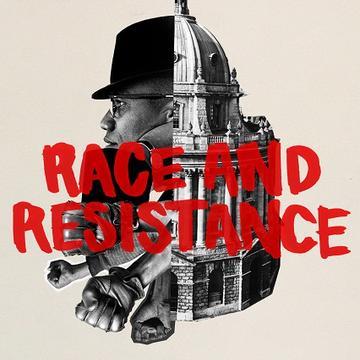CONTRACT TO CLOSET – NATHANIEL ADAM TOBIAS COLEMAN
RACE & RESISTANCE WORKSHOP

CONTRACT TO CLOSET – NATHANIEL ADAM TOBIAS COLEMAN
Part of the Race and Resistance Programme events
Speaker: NATHANIEL ADAM TOBIAS COLEMAN
Please note the event will take place at the Colin Matthew Room, Radcliffe Humanities Building, Radcliffe Observatory Quarter Woodstock Road, OX2 6GG
Friday 19 May 2023, 1-2pm
Contract To Closet This workshop is an opportunity to explore three social/political theories emerging at The "Section 28" Conjuncture and their possible relationship, both with each other and to “Section 28”—Britain’s law banning the “promotion of homosexuality”: a law which made its way through the British
Parliament between December 1987 and May 1988 and a law which Britain only first attempted to repeal in November 1999.
On the one hand, the celebrated opening chapter of the book (1990) for which Eve Kosofsky Sedgwick is most famous was originally published as articles in Spring and Summer 1988, namely “Privilege of Unknowing” (esp. pages 102-104) and “Epistemology of The Closet (I)” (esp. pages 45-53), respectively. On the other hand, the June 1988 publication of Carole Pateman’s The Sexual Contract, was the inspiration for the September 1997 publication of Charles Mills’s The Racial Contract, and for a ground-breaking panel, at the Annual Meeting of the American Political Science Association, held in Atlanta, in September 1999, titled “The Reality of Gender, Race, and Class in Political Theory”, featuring a paper presented by Pateman, “The Sexual and Racial Contracts at the End of the Twentieth Century”, and a paper presented by Mills, “Race and the Social Contract Tradition” (esp. pages 446-447), in which he first coined the term “Domination Contract” — a concept Pateman and Mills would continue to explore together in their jointly-authored 2007 book, Contract and Domination.
Theoretical attempts to bring into the same conversation the Gay Closet and the Domination Contract include Marlon Ross’s exhortation, in 2005, that we move “Beyond The Closet as a Raceless Paradigm” (esp. pages 179-184), Siobhan Somerville’s “Feminism, Queer Theory, and the Racial Closet” (2010, esp. pages 197-198), Jessica Marie Best’s coining of “the Colonial Closet” in “'Suspended Nameless in the Limbo State': Neoliberalism and Queer Caribbean Diasporas” (2013, esp. pages 24-35 and 68-77), and David Jones’s “‘Something Unspeakable’ James Baldwin and the ‘Closeted-ness’ of American Power” (2017, esp. pages 55-58).
How are the Gay Closet, the Sexual Contract, and the Racial Contract related? To the extent that these three theories are coeval with the life of a law, “Section 28” (b.1988 - d.1999), how do they enable us to explain that law and the society that enacted it?
Biography:

Image credit: Ajamu
NATHANIEL ADAM TOBIAS COLEMAN is an independent scholar-activist, employed as Project Director of the National Lottery Heritage Funded project Reclaiming Community Heritage, part of 81 Acts of Exuberant Defiance, as Public Engagement Co-ordinator for Citizens Researching Together at the University of Bristol, and as Research Fellow at the University of Warwick and the University of Exeter, where they are building a database of disputed or contested colonial statues in Britain and France, for Cast in Stone.
Born in Birmingham, they are writing a book about our collective memory of the colonial and anticolonial arguments by which Birmingham built and attempted to abolish British Empire. Find out how they came to write this book by reading “My Journey in Our Struggle“, their blog for Reluctant Sites of Memory. Get a taste of some of the arguments of their book, by watching “About The House“, their keynote for the Stephen Lawrence Research Centre, by watching “Hegel and Heyrick“, their talk for Hegel (anti)kolonial at the Humbolt University of Berlin, or by listening to “Britain’s #BlackLivesMatter Statue“, their podcast for the Henry Moore Institute.
In their current work towards this book, a chapter titled “Die of Ignorance“, Nathaniel is writing a new history of “Section 28” – the law, introduced by Margaret Thatcher’s third Government, that banned local councils from “promoting homosexuality” as a “pretended family relationship”. A closer and more critical attention to the way Black Queer activists resisted Tory attacks, in the 1980s, on both anti-heterosexist and anti-apartheid education could, Nathaniel argues, equip us better, against Tory attacks, in the 2020s, to defend both Critical Race Theory and Health, Relationships and Sex Education inclusive of Trans experience.
Please like Race and Resistance on Facebook, follow us on Twitter @race_resistance, and subscribe to our mailing list by sending a blank email to: race-and-resistance-subscribe@maillist.ox.ac.uk.
Email chantelle.lewis@pmb.ox.ac.uk with any questions.
Part of the Race and Resistance Programme events.


